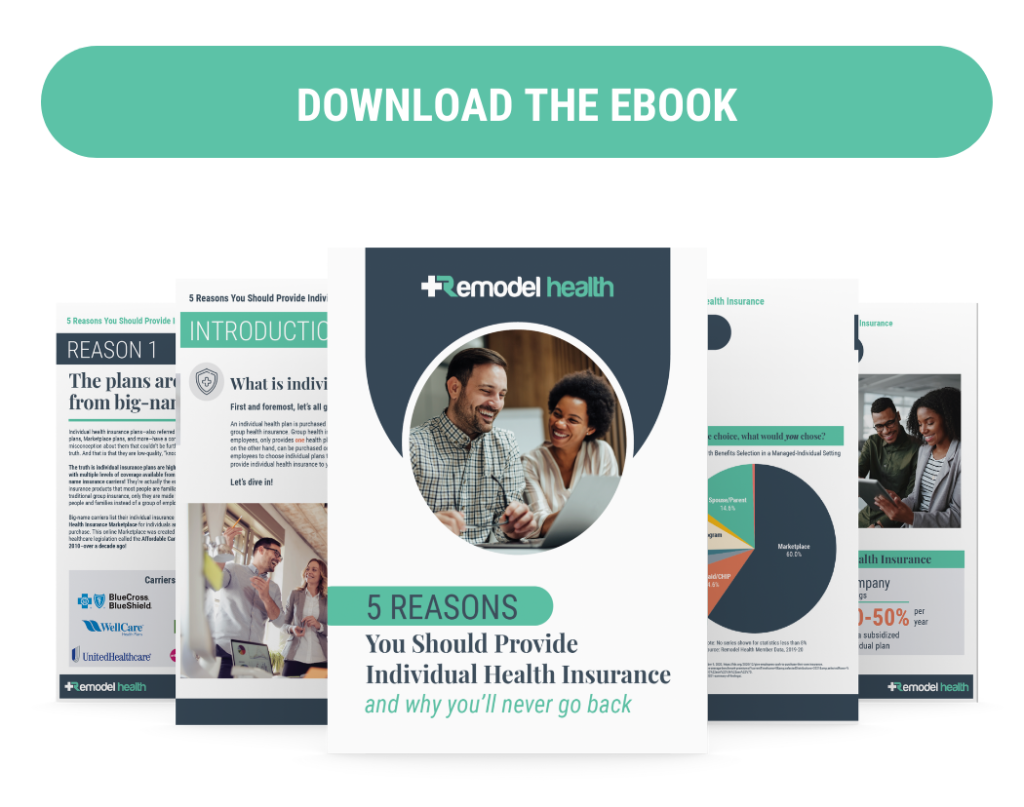When an organization as influential as Harvard says to do something, it’s definitely worth looking into. At the end of 2020, HBR released an article that truly shocked anyone who knows anything about small business health insurance. They claimed it would be better to cancel your traditional group health plan and move into a newer delivery model.
HBR reiterated its profound claims again in Q2 of 2021 and shared that the entire momentum of this new health benefits model had been accelerated by the economic impacts of the pandemic.
That is when it really caught our attention.
This had formidable data as well as an actuarial mechanism by which employers could begin to rethink their small business health insurance method of delivery. The hypothesis was just too good for our team to pass up. We dove in to see if we could prove Harvard wrong or right in this new reality they were suggesting.
1. Big problems with Small Business Health Insurance
Before we get into what Harvard is suggesting to do, let’s first talk about why it makes sense that this new option has been gaining so much traction.
Imagine having some sort of pain in your body. As that pain continues to increase, it will create movement.
Whether it’s a self-treated limp or a trip to the doctor, pain forces us to reckon with the problem. Many times, pain represents one of the last symptoms of any problem. Considering how long we’ve been facing the pain of small business health insurance, I’d say that the problem is pretty big.
But just how big are we talking?
If we take a 10-year lookback at small business health insurance, we will see some staggering statistics. The most profound, of course, are the costs. We’re not talking about random price hikes. We’re talking about a consistent and significant increase year-over-year for a decade. These increases have made the cost of small business health insurance go up by 368%.
For context, if you were already spending $1,000 a month on your employee, then it means you are now spending $5,000 on your employee per year in the early 2000s, then you are now spending around 3X what you were back then. Honestly, you’ve probably changed plans a whole bunch, networks have shrunk, and your coverage has had to get worse because of the cost increases. We’ve seen this a million times.
Perhaps equally as bad as the costs increasing are the deductibles—this is the actual coverage being offered. The deductible, by the way, is the threshold the individual must pay before the insurance starts splitting the medical bills with them. If you take a look back in that same span of time, deductibles have gone up over 212%—that means they have more than doubled. This further means individuals are paying twice as much before insurance even kicks in.
This is probably why still 2 out of every 3 personal bankruptcies are due to medical expenses. If we look at the percentage of people who actually do have health insurance in the U.S. it further means that people who do have healthcare coverage are still having to file for bankruptcy because the plans are too expensive and the plans are so bad they don’t even kick in soon enough to help.
So to recap, deductibles are twice as bad for 3X the costs, and still most people are filing bankruptcy because of medical expenses? This is just simply not adding up. It highlights the fact that small business health insurance has had a pain that we have all been experiencing.
So where do go from here?
2. New possibilities for new Small Business Health Insurance
So, we have laid the groundwork for why it’s plausible that a new style of benefits delivery is happening. What we’re doing isn’t working—at all!
What if we can look back at history and see if this same sort of problem in employee benefits has happened and what the result was? The good news is that we can! We definitely should. Looking at what history has taught us is one of the most powerful tools as we step forward into the future of small business health insurance. In order to know where we’re going, we have to look at where we’ve been.
So what can we learn from the history of employee benefits? Let’s first take a look at the word benefits. What are some of the other benefits employees have grown to become accustomed to? Perhaps reimbursements benefits, travel benefits, etc. Maybe even retirement benefits? Yes—let’s look at retirement benefits!
Let’s take a journey to 30 years ago, when pension plans were starting to be replaced by 401(k) plans. This concept came from the tremendous pain and sustainable trend of pension plans.
The pain was manifold, of course, not focusing on just one thing or another. Some of the items included as reasons for the change to the retirement plan were:
- The perpetually increasing and inaccessibly high costs,
- The weightiness upon the employer of ensuring the entire benefit remained stable not only for all current employees, but also retirees, and
- There was no personal nature to the benefit, and dollars were mediocre at best compared to the more aggressive techniques of investment that some younger employees might prefer.

There entered the 401(k) delivery style of retirement benefits to employees:
- Costs were stable and fixed pursuant to the strategy set forth by the employer,
- Freedom from the pressure of picking the perfect thing to keep everyone happy, and
- Employees owned their benefit. They made the choice on how those dollars were spent, and they were even portable from job to job.
Many of the same problems that were seen in retirement benefits are likely what you are seeing in small business health insurance, as well. So if the same problems are happening that happened 30 years ago with retirement—and more importantly the tremendous participation and success that it’s proven over the last three decades—then would it be too crazy to think that the same solutions would work to solve health insurance as well?
We’ll plan to unpack the actual vehicles through which this occurs in future weeks. The ultimate concept is that the “401(k) of health benefits” is already happening to small business health insurance, and it’s not only saving employers money but it’s getting better and more satisfying coverage to employees. Talk about improving your ability to compete!
This model of health benefits for employees is called “Managed Individual”. Similar to the switch from pension plans to 401(k) plans, instead of the employer offering one group plan to every employee, they simply provide the same money that was already being spent directly to the employees for them to spend instead.
Employees then get to pick the type of plan that matches their needs best. This can range anywhere from picking a Gold plan to picking an HSA plan and saving up dollars. We don’t have time to go into that now—but we’ll explain more in the coming weeks!
Just like 401(k) plans, employers save money and employees have a better benefit. This will allow you to keep the best employees on your team to ensure you stay competitive and stay growing.
3. Alternatives proven for Small Business Health Insurance
A claim from Harvard is obviously something worth listening to. But without the proof, it’s not always worth believing in. So where’s the proof that canceling your traditional group plan is worth it?
We wanted to know as well. So, we gathered our own proof.
In a first-of-its-kind, Remodel Health set out to do a National Health Benefits Analysis comparing traditional group versus this new managed individual. We took the top 15 academic sources in the United States surrounding the topic and then added in Remodel Health’s 3 years worth of 129,000+ unique and proprietary data points. Next, we combined and cross-referenced everything to see what we could gather and to ultimately prove whether or not Harvard was tracking down the right path or not.
It’s been proven that unequivocally, Harvard was right. The best thing for small business health insurance is to leave those old traditional group plans and move into the better, cheaper delivery style of managed individual health benefits.
This is the path moving forward.
You do not want to be stuck in the past. The best way for better costs and better coverage is managed individual health benefits.
Learn more about how Remodel Health’s ICHRA+® product can benefit your organization
Yes, you are making blind decisions about your Small Business Health Insurance.
Blind decisions are bad decisions. They cost you time and money. Without running a full analysis on your entire team, you are making blind decisions about your team’s health benefits right now—and unfortunately, you’ve probably been making blind decisions for a really long time now. You’re not alone!
This is why Remodel Health designed their exclusive Health Benefits Analysis for Employers. To gain a complete and compliant 360 view of your entire team to know what they want and what they need out of health benefits, and then discovering every single option available to cut costs while improving coverage.
The future of small business health insurance starts with your very own Health Benefits Analysis.
Get started today. Seeing is believing. It’s time for you to finally and actually see for the very first time. Click here to learn more about our Health Benefits Analysis with prices that start at just $35 per employee.

Important Notice: Remodel Health does not intend to provide specific insurance, legal, or tax advice. Remodel Health always recommends consulting with your own professional representation to properly evaluate the information presented and its appropriate application to your particular situation.
